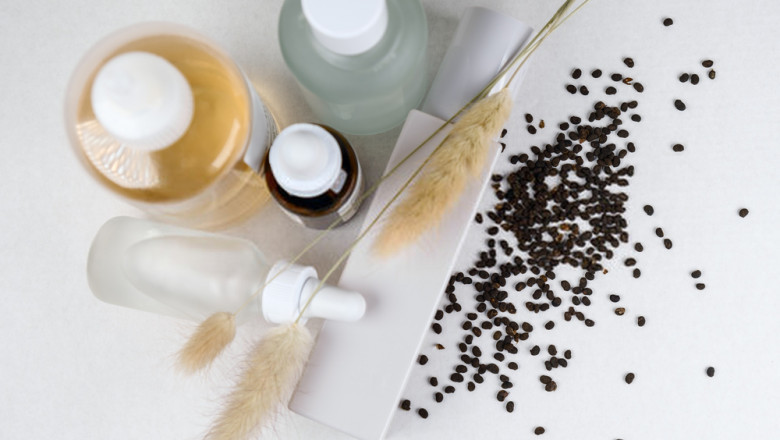views

Retinol has long been the skincare favorite for its ability to cure wrinkles, discoloration, and acne. But there’s a catch:
it can make your skin dry and inflamed.As a result, some skincare companies turn to Bakuchiol, a novel natural alternative to retinol.
It’s said to provide similar skin advantages without the aggravating side effects.Should you give up your retinol in favor of this new skincare ingredient? You’ll learn what Bakuchiol is, what it can do for your skin, how it compares to retinol (and if it’s safe to use during pregnancy), and which products to try right now in this guide.
The What
Bakuchiol is a plant extract that is completely natural and vegan. It comes from the Babchi plant, native to India and Sri Lanka, and used in Ayurvedic and Chinese medicine for thousands of years. The chemical is extracted from Babchi seeds and leaves before being refined commercially.
You may believe that Bakuchi seed oil and Babchi oil are interchangeable, but this is not the case. Depending on the purifying procedure, they may contain some bakuchiol, but not at the concentration required to realise its advantages. As a result, when examining ingredient lists, search for Bakuchiol specifically.
How Does Bakuchiol Work?
The principal mechanisms of action of Bakuchiol are as follows:
-
Regulates collagen formation: Similar to retinol, it has collagen-regulating and gene-modifying properties, according to this study.
-
According to this study, it also protects the oxidative destruction of lipids (natural fats found in our skin).
-
Inhibits melanin production: According to another study, it suppresses the hormone that causes melanin to form in the skin.
-
Reduces inflammation: Anti-inflammatory effects were discovered in this investigation.
-
It may even be antimicrobial, as it was found to reduce acne bacteria in a compound with Gingko biloba and mannitol in this study.
The Why
Is Bakuchiol effective? While additional research is needed because it lacks the enormous quantity of clinical evidence that retinol possesses, these are the most essential benefits discovered thus far.
-
Improves Signs of Aging
Bakuchiol appears to be the most promising treatment for aging indications. Participants in this trial applied a 0.5 percent concentration twice daily for 12 weeks. Fine lines and wrinkles, elasticity, firmness, and UV damage all showed “substantial improvement.”
This study likewise employed the same dosage of 0.5 percent twice a day for a 12-week period. It was also discovered to “substantially reduce” wrinkle surface area.
-
Protects From Free Radicals
Bakuchiol is also an antioxidant, which means it can help protect your skin from free radical damage. It works by preventing free radicals from “stealing” electrons from the natural lipids in your skin, which causes oxidative deterioration (a.k.a lipid peroxidation, a major factor in skin aging).
When skin lipids, such as squalene, sebalaic acid, linoleic acid, and cholesterol, oxidize, they influence the charge and pressure of cells, causing swelling and cell death. In avoiding these alterations, Bakuchiol outperforms the most common antioxidant, vitamin E.
-
Fades Pigmentation
If you have dark patches or discolorations, Bakuchiol might be worth a go. Two studies (here and here) indicated that applying 0.5 percent twice a day for 12 weeks reduced pigmentation significantly. It was discovered that it inhibited melanin synthesis better than arbutin in this investigation.
-
Reduces Acne
Finally, Bakuchiol can be used to treat and prevent breakouts. Although it was conducted by the company, this study indicated that applying 1 percent twice a day for six weeks decreased acne by 57 percent.
The researchers also compared it to 2 percent salicylic acid, which only reduced acne by 48 percent when administered twice daily. (However, I believe this is due to first purging, which is a natural and good reaction.) The highest outcomes came from combining both substances, which resulted in a 67 percent reduction in acne.
The researchers found that numerous factors were at play based on their findings. Bakuchiol destroys acne germs and reduces swelling because it contains antibacterial and anti-inflammatory qualities. It also reduces sebum oxidation, which is a driving force in acne advancement.
Is Bakuchiol Better Than Retinol?
Bakuchiol serums may appear to be a better alternative than retinol for many of the same reasons, especially if you’re searching for a mild, plant-based component. Here’s how they stack up:
-
Almost as effective as retinol: Bakuchiol applied morning and night can be nearly as effective as retinol applied overnight. For a 12-week period, subjects were given either 0.5 percent bakuchiol twice per day or 0.5 percent retinol once per day, with no statistically significant difference in their outcomes. Keep in mind that Bakuchiol will not be as effective as more potent retinoids like retinaldehyde or retinoic acid.
-
Bakuchiol is less irritating to the skin than retinol, which is infamous for causing irritation. The authors of this study highlighted that it produced outcomes without the typical “unwanted consequences” associated with retinol therapy. In this study, retinol users reported “facial skin scaling and stinging,” whereas bakuchiol users did not, leading to conclusion that it is better tolerated.
-
Retinol and other types of vitamin A should be worn at night since UV rays can degrade them and make them less effective. Furthermore, because they replace old skin cells with fresh new ones, they can leave your skin more sensitive to sunburn. On the other hand, Bakuchiol does not make skin more sun-sensitive and is UV stable, according to this study.
Is Bakuchiol Safe for Pregnancy?
Doctors generally advise women to avoid topical and oral retinoids during pregnancy and breastfeeding, including retinol. However, it’s unclear whether Bakuchiol is a safer alternative.
Some experts say that Bakuchiol is completely safe, unlike retinols, which should be avoided during pregnancy.
Others are holding out for additional proof and recommend consulting with your doctor if you’re pregnant or nursing before putting anything on your skin.
While Baku is a plant, there hasn’t been enough testing done on it yet, and while there isn’t enough evidence to recommend it for pregnant women, its botanical origin may make it a safer option.”
Pregnant and breastfeeding women should stick to the items listed here until we learn more.
The Best Of IT
So you’ve considered the benefits and drawbacks and are ready to test this ingredient. Here are some of your greatest options.












